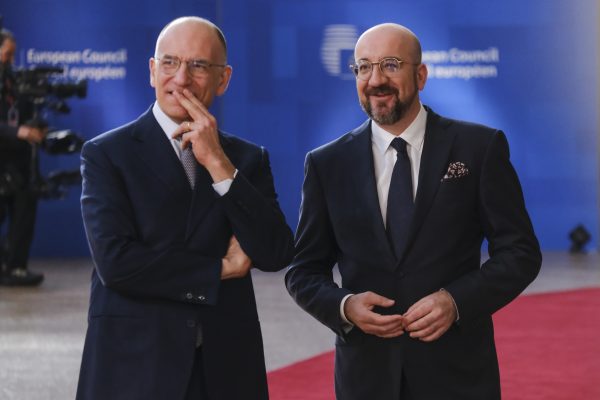Macron said the Inflation Reduction Act (IRA), a $369 billion program that subsidizes US electric carmakers but excludes European competitors, represents unfair protectionism and risked “fragmenting the west.” He also criticized the US CHIPS Act for favoring the US semiconductor industry.
How hypocritical. The French president overlooked France’s own push for what it calls “digital sovereignty.” France has imposed a special digital tax on US tech platforms. It has fought for Europe to enact its own semiconductor subsidy program. And Paris now wants to ban US cloud providers led by Amazon, Microsoft, and Google from bidding on many contracts.
The upshot sours transatlantic relations, which otherwise had recovered from their lows under President Trump and by a common resolve to support Ukraine. Both sides need to step back, agree on ground rules for acceptable support of domestic industries, and avoid outright trade-distorting restrictions.
A truce looks possible. During his press conference with Macron, US President Joe Biden promised to make “tweaks that we can make that can fundamentally make it easier for European countries to participate” in the electric car program. “We had a very good discussion on the IRA and we decided to synchronize our approaches,” said a satisfied Macron.
But Biden didn’t announce specific solutions and the conflict hangs over the scheduled Trade and Technology Council (TTC) taking place on December 5 at the University of Maryland. France’s influential European Commissioner Thierry Breton is boycotting the TTC meeting because it “no longer gives sufficient space to issues of concern to many European industry ministers and businesses,” a Breton aide said in a statement.
The threat of a subsidy race or a trade war remains high unless both Europe and the US resist their most protectionist instincts. For Europe, this means rejecting a French version of digital sovereignty. Northern Europeans led by Germany see “digital sovereignty” as building up the European industrial know-how and capabilities in key strategic areas.
An early, successful example of European industrial collaboration was the plane maker Airbus. A more recent example is the European Battery Alliance, launched in 2017, to “create a competitive manufacturing value chain in Europe with sustainable battery cells at its core.”
But translate digital sovereignty into “Souveraineté Numérique” and it veers into anti-American protectionism. Consider a few French-inspired schemes. In 2020, Paris imposed a 3% “Digital Services Tax” on a broad swatch of US digital platforms. A single French company Criteo was initially included, though it lobbied successfully to be excluded.
Local control over cloud computing represents another French obsession. In 2021, France’s national cybersecurity agency ANSSI revised its cybersecurity certification and labeling program to disadvantage—and effectively preclude—foreign cloud firms from providing services to government agencies. “Similar to China, it would effectively only allow local firms to attempt for certification,” explains Nigel Cory of Cross-Border Data Forum.
France often attempts to impose these policies on Europe. In September, the EU proposed a “Cyber Resilience Act.” It would impose a certification scheme, in which the highest grade would only be open to European companies, excluding the US and global leaders Amazon, Microsoft, and Google.
Like most protectionist measures, this cloud offensive promises to be counterproductive. It will force European companies to use high-priced, low-performing local providers. It will, perversely, prove a security risk – the best way to protect data, cybersecurity experts agree, is to distribute, not localize it, and to store it with the biggest, most technologically advanced providers.
The US, of course, is also guilty of “Buy American” unilateralism and favoritism. Even under Atlanticist Biden, Washington often attempts to bully Europeans, starting with the recent introduction of strict export controls limiting China’s access to high-end computer chips.
But Europe risks losing a tit-for-tat subsidy and protectionist war. Despite the success of Airbus, such collaborative European-wide industrial ventures suffer from a poor track record, including expensive failures such as a public European search engine Quaero to compete with Google.
The continent, facing soaring energy costs and a recession, just doesn’t have the cash to compete with the US. Earlier this year, the European Commission vowed 43 billion euros of public investment to back the EU’s chip dreams. But the EU executive struggled to explain just how that funding would come together. In contrast, the US has budgeted $52 billion for its own semiconductor subsidies on top of the hundreds of billions in electric car subsidies. If there is a transatlantic subsidy war, the US, not Europe, has the cash to win.
Bill Echikson is the Acting Director of CEPA’s Digital Innovation Initiative.
Bandwidth is CEPA’s online journal dedicated to advancing transatlantic cooperation on tech policy. All opinions are those of the author and do not necessarily represent the position or views of the institutions they represent or the Center for European Policy Analysis.





